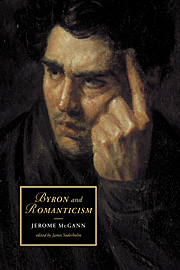Book contents
- Frontmatter
- Contents
- Acknowledgments
- General analytical and historical introduction
- PART I
- PART II
- 10 A point of reference
- 11 History, herstory, theirstory, ourstory
- 12 Literature, meaning, and the discontinuity of fact
- 13 Rethinking Romanticism
- 14 An interview with Jerome McGann
- 15 Poetry, 1780–1832
- 16 Byron and Romanticism, a dialogue (Jerome McGann and the editor, James Soderholm)
- Subject index
- Authors index
- CAMBRIDGE STUDIES IN ROMANTICISM
10 - A point of reference
Published online by Cambridge University Press: 22 September 2009
- Frontmatter
- Contents
- Acknowledgments
- General analytical and historical introduction
- PART I
- PART II
- 10 A point of reference
- 11 History, herstory, theirstory, ourstory
- 12 Literature, meaning, and the discontinuity of fact
- 13 Rethinking Romanticism
- 14 An interview with Jerome McGann
- 15 Poetry, 1780–1832
- 16 Byron and Romanticism, a dialogue (Jerome McGann and the editor, James Soderholm)
- Subject index
- Authors index
- CAMBRIDGE STUDIES IN ROMANTICISM
Summary
The concept – and the problem – of the referential aspects of literary works is so central to an adequate literary theory and critical practice that it must be addressed. Two things may be initially observed. First, referentiality appears as “a problem” in formalist and text-centered studies precisely by its absence. Though everyone knows and agrees that literary works have socio-historical dimensions, theories and practices generated in text-centered critical traditions bracket out these matters from consideration, particularly at the level of theory. Second, referentiality appears as a problem in historically grounded criticism because such criticism has thus far been unable to revise its theoretical grounds so as to take account of the criticisms which were brought against it in this [the twentieth] century, and in particular the criticisms developed out of the theory of literary mediations. Involved here is the view, pressed strongly on various fronts in the past fifty years, that language and language structures (including, perforce, literary works) are modeling rather than mirroring forms. They do not point to a prior, authorizing reality (whether “realist” or “idealist”), they themselves constitute – in both the active and the passive senses – what must be taken as reality (both “in fact” and “in ideals”). To the extent that traditional forms of historical criticism have not been able to assimilate or refute such a view, they have been moved to the periphery of literary studies.
- Type
- Chapter
- Information
- Byron and Romanticism , pp. 205 - 222Publisher: Cambridge University PressPrint publication year: 2002

